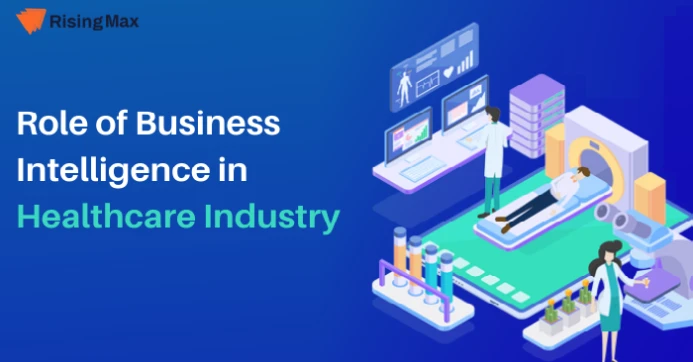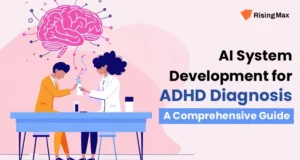Healthcare is a branch that plays the most crucial role in saving lives, and technology is one of the main contributors to developments in the sector. Technology has brought many transformations in hospitals, clinics, and doctors are now better equipped to treat illnesses.
At present, the healthcare industry is also generating a lot of data under three broad categories- Financial, operational & clinical.
Though there is a lot of data, information is significantly less. Unsurprisingly, the healthcare industry is on the brink of transformation, and Business Intelligence (BI) has become an essential aspect of this establishment.
Healthcare establishments must apply Business Intelligence to keep clinical, business, and operational data organized. This need has given rise to the importance of Business Intelligence in healthcare.

Leveraging Business Intelligence Software for Healthcare Management
Business Intelligence utilizes software and services to convert data into actionable insights. Furthermore, these insights tell about an organization’s strategic and tactical business decisions.
In simpler words, BI offers people a way to examine data and understand trends to generate insights and merge & query the data to make better business decisions.
Business Intelligence systems render historical, current, and predictive views of business operations. Earlier, the organizations didn’t realize the importance of BI but have accepted that their operations can’t do without BI. There is a surge in the demand to integrate BI into the healthcare industry owing to its uses.
This blog post is dedicated to discussing the role of Business Intelligence in the healthcare industry. Before that, let us go through a few verified facts that speak about BI and the healthcare industry.
Did you know?
According to a report by Stratistics MRC, the overall market share of business intelligence in healthcare is set to see an increase of about 17.4% from $3.75 billion in 2017 to $15.88 billion by 2026.
The global healthcare business intelligence market is expected to grow at a compound annual growth rate of 12.8% from 2019 to 2025 to reach USD 10.64 billion by 2025.
Data-related challenges faced by the healthcare industry
Various challenges face the healthcare industry, especially the ones related to patient data. To overcome these challenges, the sector first needs to identify them before leveraging the power of healthcare business intelligence solutions. We have listed the significant challenges that the medical industry comes across.
- Data security
Protecting patient data is of utmost priority for healthcare providers as this industry is prone to cyber-attacks. Various elements ought to be protected, which is a challenge in itself. There must be a balance between safeguarding patient data and utilizing the data for invention and research. Healthcare organizations need to adhere to some regulations to keep the data safe and ensure patient privacy.
- Data quality
Most healthcare data is available in unstructured forms like images, text, numeric, audio, and visuals. The major challenge here is to make this data available in a way that talks about the financial aspect and the transactional data related to patient care, staff, and performance. In other words, EMR systems are not resourceful and interoperable.
- Data Sharing
There is a constant need for sharing clinical data across organizations like hospitals, research centers, pharmacies, and more. But then arises the problem of privacy. Moreover, there is no universal approach to storing data, making it difficult to achieve interoperability with other data management systems.
- Cross-domain and consolidated analysis
The healthcare industry requires combining data from various sources and then consolidating them to get a sorted view. Due to the absence of a cross-domain analysis of the data collected, it poses a significant hurdle to get comprehensive patient information.
- Lack of technological innovation
Medical centers collect vast amounts of data daily. However, it cannot be used unless there are appropriate infrastructure, technology, and tools. Generally, healthcare centers do not have the right technology in hand for managing the data. This industry needs to adapt to the modern world and use technology to streamline its process.
Align the current state of IT with your business strategy by hiring the most trustworthy AI Development Company
Role of BI in the healthcare industry
Every segment of the modern world depends on technology, and healthcare is no different. Business Intelligence in healthcare is something that has gained popularity due to the benefits that it brings along.
- Promotes effective & faster decision-making
Healthcare professionals often come across situations where they need to collaborate with specialists from other departments. However, due to the unavailability of resources, equipment, and facilities, their collaboration and subsequent decision-making sometimes get delayed. To avoid delays, quick access to patients’ insights on a centralized BI portal can be utilized. This will aid the swift collaboration of healthcare professionals among various departments and expedite the patient care process.
- Improved risk management
The availability of complete patient history on systems based on different related metrics allows healthcare institutions to predict any medical challenges that a patient would face. As a consequence, it becomes easy for specialists to take preventive measures and reduce the risk level. Leveraging Big Data, doctors can acquire relevant information and prescribe medications or direct patients to adopt lifestyle changes.
- Better cost allocation
When a user understands healthcare information quickly through a source like BI, he/she can use the insights to address risks and forecast future events. The benefits that come along are better patient & clinical consideration, improved faculty dispersion, decreased re-admissions, and monitoring costs required to utilize business intelligence applications in healthcare. Additionally, having all the requisite data available makes it easier to perform tasks like costing and billing seamlessly and error-free. This is why Business Intelligence in the healthcare industry has become a prominent part of today’s world.
- Informs about any shortcomings
No industry is perfect. Undoubtedly, the healthcare industry is the riskiest sector of the economy and is highly prone to failure. Business Intelligence in the healthcare industry helps organizations analyze the data and identify the factors that led to the failure of treatment or any other relevant failure. Accordingly, they can take corrective measures to amend the processes in the future.
- Claims management
Business Intelligence in healthcare monitors cases for health insurance companies and speeds up the reaction time against claims. Apart from it, BI can also protect insurance companies against fake cases and improve their estimation processes.
KPIs to consider for knowing the relevancy of BI in the healthcare segment
- Clinical data KPI
A healthcare service provider can ramp up the quality level and resource utilization by monitoring clinical performance and outcomes data. Healthcare organizations can track large amounts of data from clinical activities and identify the most efficient processes. BI lets doctors, diagnostic centers, and pharmacies work from the same data securely.
- Patient care KPI
BI Healthcare solutions allow timely access to the right people who strive to provide the highest quality healthcare services to the patients. It promotes better decision-making and connecting patients with the right medical service providers. Ultimately, it leads to improved patient care, reduction in wait times, and administration of better treatments.
- Financial KPI
Obtaining transparency in financial operations is an enormous task in the healthcare industry. BI enables one to gain a detailed analysis of costs and revenue, cash flow, and compare the results with the planned version. Besides, it also enables healthcare establishments to meet statutory reporting requirements and ensure full accountability.
- Quality and performance KPI
BI allows providers to work on their performance by leveraging evidence-based performance data, identifying variations, and setting alerts for drug interaction. The providers can determine whether the interventions are present or not, recommended by evidence-based medicine.
- Marketing KPI
The healthcare industry is highly competitive, and each one of them needs to use technology to stay ahead of others. Business Intelligence in the healthcare industry helps analyze the success rate of marketing efforts to reflect the clinical effectiveness of the services. And it doesn’t end here because BI allows healthcare providers to use dashboards and see which products & services are profitable in which segment. In totality, healthcare providers can see how well their marketing efforts are improving brand performance.
Business Intelligence Software for Healthcare Industry
It’s never too late to know about the things your business requires. Healthcare Business Intelligence solutions introduce the economy to a good number of the most prevalent healthcare BI software tools. Walkthrough the list of the most potent BI software tools highly popular in the healthcare vertical.
1. Power BI
Power BI is a business analytics service by Microsoft that aims to deliver interactive visualizations and business intelligence capabilities. It has a simple interface that lets users create their own reports and dashboards. The tool supports more than 120 data connectors to hundreds of on-premises and cloud data sources. The user can analyze data in the form of customizable reports, and the dashboard is designed keeping every critical aspect in mind.
Why choose Power BI for the healthcare industry?
- Visualization of data through pre-built, interactive, and customizable graphs and charts.
- Ease of use.
- Generation of customizable paginated reports from your data.
- Empowers faster decisions.
- Protects patients’ privacy.
- Built-in AI
2. Sisense
Sisense is a platform designed for end-to-end data discovery and business intelligence. It includes everything necessary for data preparation, analysis, and visualizations through single-stack technology. The tool facilitates quicker decision-making by performing thousands of queries on large amounts of data and returning the results rapidly.
Why choose Sisense?
- Healthcare analytics modules are built primarily to analyze healthcare data.
- Exceptional data connectivity.
- Interactive dashboard.
- Automated KPI monitoring.
- Collaboration tools to facilitate collaboration between users.
- Highly secure.
3. Tableau
Tableau is famous for its feature of creating visually stunning dashboards from its data. It allows healthcare organizations to become more data-driven and better the customers’ experience. The tool offers both SaaS and self-hosted deployment models.
Why choose Tableau?
- Augmented data preparation.
- Provides AI-driven data for the explanation.
- Highly secure.
- Enables the building of interactive and responsive dashboards.
- Geospatial analysis.
- Natural language processing.
- Offers customizable starter kits for deploying platforms.
4. Qlik Sense
Qlik Sense is a comprehensive self-service data analytics platform that employs artificial intelligence and an associative engine. It allows healthcare providers to combine all their data and seek answers to all their questions. Reflecting technology, it allows flexible deployment options through a multi-cloud architecture.

Why choose Qlik Sense to measure healthcare data?
- EHR integration.
- Allows customizations of data visualizations with drag-and-drop functionality.
- Gesture-based touch UI
- Innovative engine
- Context-aware insight suggestions.
5. Diver Platform
Diver Platform is a complete end-to-end suite of data analytics tools that invites users to “dive” into ad hoc analysis and self-service data discovery. It gathers information from disparate data sources into a single database.
Why choose the BI Diver Platform in Healthcare Industry?
- Provides access to a multitude of data sources.
- Customized dashboards.
- Provides a guided analysis process to increase productivity.
- Ad Hoc Analysis.
- Industry-specific KPIs.
Conclusion:
It is undeniable that BI plays and will continue to play the most vital role in the healthcare industry. Consequently, this has made this industry widely available. Still, there is much more to achieve when we talk about business intelligence in healthcare. Not every healthcare provider is well aware of what benefits Business Intelligence can bring to their plate.
As healthcare organizations begin to harness the potential of BI, the industry will see various transformations coming it is way.
You need to go on and find yourself an IT consulting company that can serve you with healthcare business intelligence solutions. Take a step towards ramping up your healthcare business by letting BI serve it.
Connect with RisingMax – the most trusted IT Consultant Company capable of rendering ultimate solutions to healthcare providers and making BI a part of their business. We will be more than glad to assist your healthcare business in keeping everything sorted so that you can keep serving the community with excellence.














